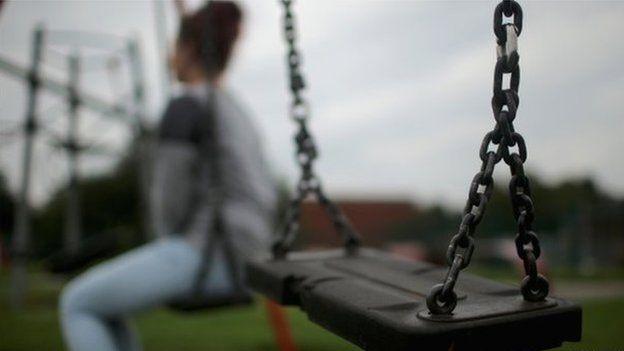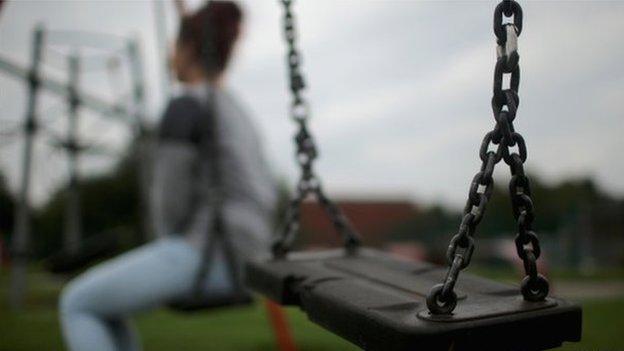Adoption law reform aims to speed up placements
- Published

A child's "need for stability" must be better taken into account, says the bill
A shake-up of adoption rules in England aims to move more children more quickly from the care system to family life.
The Children and Social Work Bill, unveiled in the Queen's Speech, aims to reduce delays in placing children with an adoptive family.
The new law will also aim to improve social care standards across England.
The Queen's Speech also set out plans, through an Education for All Bill, to encourage - though not require - all schools in England to become academies.
The Higher Education and Research Bill, which supports the establishment of new universities, was also highlighted in Wednesday's speech.
The policy is aimed at promoting choice and competition in England's higher education system.
Permanent adoption
The government says the Children and Social Work Bill will "tip the balance in favour of permanent adoption, where that is the right thing for the child... and drive improvements in the social work profession by introducing more demanding professional standards and setting-up a specialist regulator for the profession".
The legislation aims to give young people leaving the care system more help, with a commitment by local authorities act as better "corporate parents", helping them when they make the transition into independent living.
Care leavers will have the right to have a personal adviser, until they are 25, to help them with the move into adulthood.
Courts and local councils will have to "take better account" of a child's need for stability when making adoption decisions as part of the changes.
A specialist regulator for social work will also be established to improve standards and training.
Ministers say change is necessary to improve the life chances of those who have been in care.
Around 10,000 children leave residential or foster care each year. And, by the age of 19-21, 39% are not in employment, education or training.
The number of children in England being looked after by the state rose to nearly 70,000 last year.
The National Children's Bureau said the plans showed "great promise" for those leaving care, but chief executive Anna Feuchtwang warned that cuts in services could have a negative impact on those who remained.
"It is, however, disappointing to see no clear strategy guaranteeing services which intervene early to improve children's lives and future outcomes, or any evidence to illustrate how early help will be supported in the current programme of austerity," she said.

Jon Sparkes, chief executive of homelessness charity Crisis, welcomed the proposal for a care leavers' covenant, saying: "Young people have too often been forced out of care before they're ready - our research shows that one in four homeless people have been in care as children."
But he said the Queen's Speech failed to address the "urgent" need for a change in the law to tackle homelessness through properly funded prevention and early intervention schemes.
Academies encouraged
The Queen's Speech also outlined how all schools in England will be encouraged to become academies.
The Education for All Bill, which aims to "spread educational excellence everywhere", says one of its main aims is changing schools to academies in the worst performing local authorities.
But the government will stop short of using its latest education bill to make all schools convert and will instead only push forward with compelling academy conversions:
where it is clear that the local authority can no longer viably support its remaining schools because too many others have already become academies or
where the local education authority consistently fails to meet a minimum performance threshold across its schools
The Education Secretary Nicky Morgan said earlier this month that plans to make schools switch had been dropped - this followed fierce criticism from teachers, parents, unions and even some Conservative MPs.
One of the stated aims of the legislation is to "move towards a system where all schools are academies, and all schools are funded fairly".
It also aims to make the process of becoming an academy "swifter and smoother".
The Local Government Association said it remained opposed to any forced academisation.
Cllr Roy Perry, chairman of the LGA's Children and Young People Board, said councils had a vital role to play in school improvement.
"Hundreds of schools, often in disadvantaged areas, are being turned around thanks to the intervention of local councils, highlighting that they should be regarded as education improvement partners rather than as a barrier to change."
The government's legislation also aims to redress "historical unfairness" in school funding, using a national funding formula to ensure money is allocated "fairly and efficiently".
Russell Hobby, general secretary of the National Association of Head Teachers, said a commitment to a fair funding formula was welcome, but warned of tight budgets for schools.
"A fair funding formula will not work without sufficient funding in the system as a whole. Schools cannot deliver educational excellence without talented staff recruited and retained."
The Education for All Bill will also place a responsibility on schools when it comes to the next educational steps of excluded pupils.
General secretary of the Association of Teachers and Lecturers Mary Bousted said: "We are pleased the government is going to focus on vulnerable pupils to ensure their education, whether in mainstream or alternative provision, is safe and of a high standard.
"But school leaders are already under intense pressure which is driving many from the profession. Without enough appropriately qualified staff, any reforms are unlikely to work."
- Published15 May 2016

- Published2 November 2015
